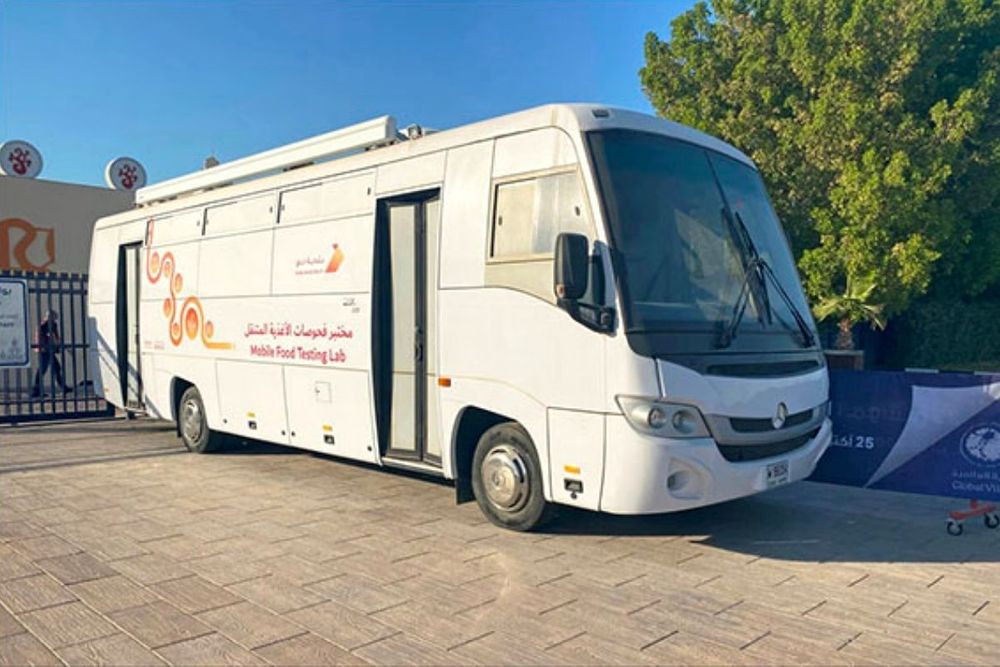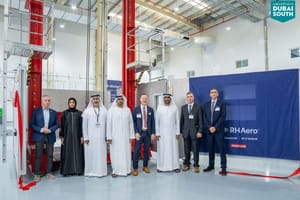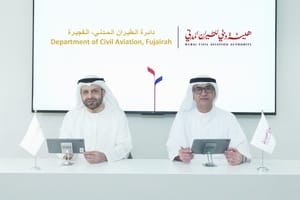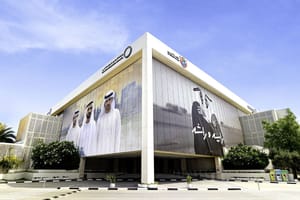In an effort to preserve the safety and health of community members, Dubai Municipality has launched Qoot, a service that offers food sample collection and tests on the same site, by adopting the latest technology, to ensure fast results with high accuracy, in addition to enabling the customer to check the quality and safety of food products to ensure that it is free from disease-causing bacteria and harmful chemicals, and that it conforms to the approved local and international specifications, and immediate detection of food-borne pathogens.
Khalid Sharif Al Awadhi, CEO, Health, Safety and Environment Sector in Dubai Municipality said:
“This service is provided to many groups, namely individuals, business sector such as food traders and food preparation establishments, and the governmental and semi-governmental sectors such as the Ministry of Climate Change and Environment, Customs, Ministry of Health, Dubai Police and the Armed Forces, in addition to internal and external partners.
The aim is to develop a service for testing food samples and activate the Municipality’s legislative and supervisory role to finish testing samples within the specified time. Therefore, a smart link was made by launching an IT program with high efficiency that guarantees the reliability and speed of completing the testing of samples within a maximum of four days, in order to achieve the government's smart goal.
There is no actual visit required and the customer can now get the samples tested from anywhere in the world because it is a smart service. They can send the test request online and send the sample to the laboratory.
The service is also characterized by the integration of equipment that enables the system to extract the results directly, which saves a lot of time. The system also has a tracking feature where a sample can be tracked at every stage. This increases the efficiency of the laboratory, in addition to providing key performance indicators (KPI) as the use of the laboratory software system helps in reducing human error, and the use of time will also increase the efficiency of accuracy of the system,” Al Awadhi pointed out.
He said the service also aims to develop and use modern, advanced and fast technologies to include testing related to food safety to expedite the release of food shipments and reduce cases of food poisoning, in order to provide a distinct and sustainable service.
"The device is used to examine the bacterial pathogens present in food by genetic content (DNA) in the shortest period of time, with high quality and efficiency. The ability to check different types of pathogenic bacteria on one device and in the same period of time, contributes to reducing consumables such as pipettes, dishes, etc., agricultural circuits, and chemical substances used in the traditional tests that harm the employee and the environment. It can also rationalize water and electricity consumption, and enhance customer confidence.
All the tests have been approved by the International Standards Organization (ISO 17025), as most laboratories must hold accreditation in order to be considered technically qualified. Our laboratory has also acquired five intellectual properties in the food testing service, in addition, it keeps pace with developments and food revolutions by offering new chemical and microbiological tests based on available technologies and international procedures. However, the lab can develop in-house methods based on scientific studies on new foods, to be in line with new food technologies.
We have adopted the latest and most accurate technology in food testing, and these tests are internationally accredited by AOAC (Association of Official Agricultural Chemists). It brings together government, industry and academia to create standardized methods of analysis that ensure the safety and integrity of foods and other products that affect public health around the world. Using fast-track technologies, the laboratory was able to accept a greater number of samples such as ready-to-eat food,” Al Awadhi pointed out.
He said the number of samples has been increased by 176% in the period 2019-2020 compared to 2018-2019 and also in the fruits and vegetables group, the number of samples increased by 79% over the previous year.
“Dubai has imported 2,412,232 tons of products that are included in the food security strategy such as baby food, vegetables, fruits, meat, poultry, rice and dairy products, the fast track technologies such as VIDAS, BAX, Petri film and Molecular and the detection system MDS, GC-MS / MS and LC-MS / MS and UPLC targeted these products to reduce the testing time from five to three working days.
A mobile laboratory was also provided to reach different places with high efficiency, and the “Testing from the Source” project was initiated in coordination with the country's embassies in many countries. The initiative to establish a mobile laboratory (ML) was taken so that the project provides high accuracy and fast results using the latest technologies, in order to detect the presence or absence of foodborne pathogens, as 18,000 food establishments were inspected and the cases of food poisoning were reduced and controlled to 1143 cases,” he informed.
Al Awadhi said the mobile laboratory is used to provide food testing services and monitor the safety and quality of food in different locations covering most of the events in Dubai such as the Global Village, Expo 2021, Dubai Airshow, and Dubai World Cup.
“Risk assessment is done by building an advanced mechanism for a food risk assessment matrix during the process of food registration and classification to protect public health from food-borne diseases. The initiative aims to build a mechanism for a food risk assessment matrix in accordance with international best practices for food during food registration and classification. The initiative is directly related to the strategic objective of Dubai Municipality: to enhance confidence in food safety,” he added.
Al Awadhi pointed out that imported foodstuffs account for the majority of foodstuffs (7,796,475 tons) on which the risk engine operates due to the high rate of consumption locally and through this mechanism, the risk level of the food product is prioritized for food sampling, thus speeding up the release of 345,423 shipments that require 29,944 laboratory tests.
“The initiative aims to keep abreast of developments in the field of food industries and adding new products and their conformity with approved food specifications, and to propose the preparation of a new food standard for them. It also aims to analyze data on the results of previous laboratory tests, as there are results for 207,542 food samples and can be used in the formulation of a scientific methodology for managing and evaluating food risks,” he said.
Canonical Link: http://www.dubaiprnetwork.com/pr.asp?pr=150474
© 2017, Global Innovations and WorldPRNetwork.com









